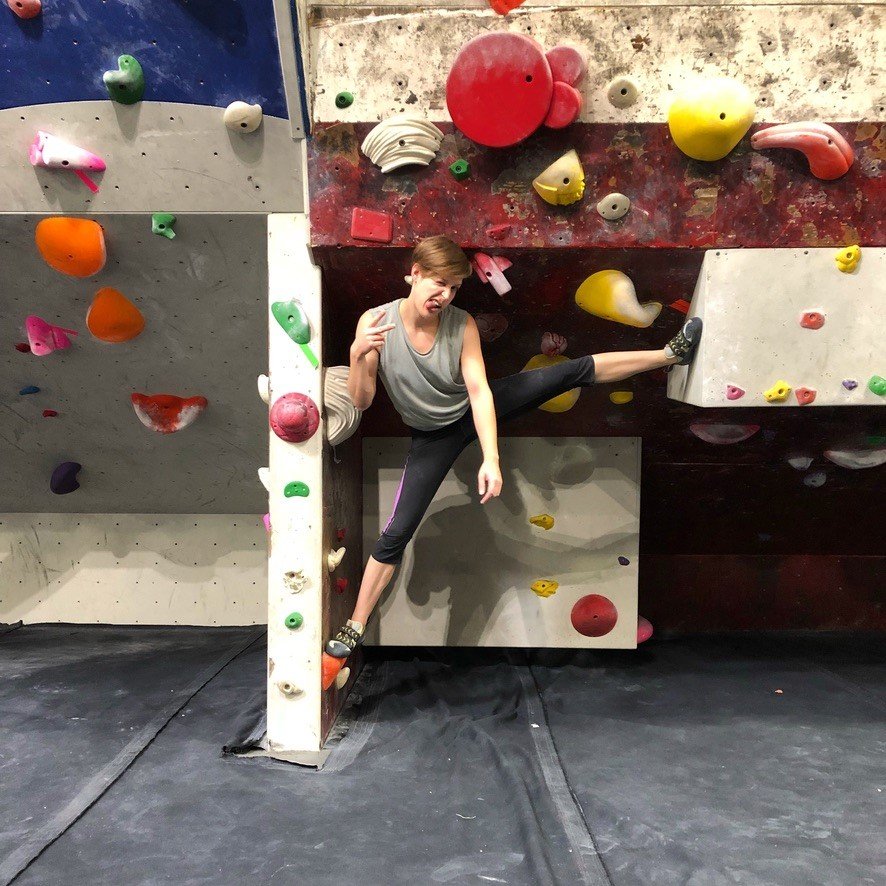What Rock Climbing Has Taught Me About Surgery (and Vice-Versa)
Lindsay L. Graves, DDS, MD
2/28/2024
A layperson entering a climbing gym will likely be surprised to see the majority of the athletes not on the walls climbing, but on the gym mats, just sitting, often laid out like beached whales. This is because rock climbing is just as much of an endeavor of the mind as it is of the body. Surgery is much the same. Involvement in this pastime has taught me lessons applicable to our practice.

1. “Problem”-solving is part of the process.
In the world of competitive and recreational rock climbing, a route is referred to as a “problem.” A problem is designated by a start hold and a finish hold, with intervening holds and features between the two. There is no one prescribed way to get from Point A to Point B, just what you have to work with, and the goal. Climbers can be seen staring at the wall, making cryptic gestures with their hands, envisioning the sequence of their moves. Surgery is much the same: We start with a goal in mind and must meticulously plan each step towards this goal, using the unique anatomical features provided by each patient. Though the ultimate objective of formulating the plan is the execution of the plan, there is often deviation. Viewing the wall from the ground is different from being on the wall. Pre-op imaging only allows our minds to predict what the anatomy will be like. Therefore, in both scenarios, it is just as prudent to have a plan as it is to know when to alter said plan — so long as the desired outcome is achieved in the end.
2. You must fall to rise.
The rock wall is humbling. Teeth are humbling. No matter how good you are, or think you are, there is always a new challenge to be had. Just as no two problems are the same, no two patients are the same, and there is something to be garnered from every case. In both climbing and surgery, we only get better through continued practice. We may struggle at times, but this is how conscious learning and muscle memory are developed. There is no success without previous failures.
3. Hands are both afferent and efferent.
The reader will recall day one of anatomy class: Afferent neurons carry information from sensory receptors to the central nervous system; efferent neurons carry motor impulses to the periphery (or, the only way that the simple mind of this writer can keep it straight: “afferent arrives; efferent exits.”) The hands are the primary tool of both surgeons and climbers. Hands enact change upon that which they manipulate. This is obvious to the novice in both disciplines. Less obvious, but equally important, is the sensory information they receive. The item manipulated, be it human tissue or a plastic rock, conveys data back through the hands (e.g. texture, density, resistance). A constant oscillation of afferent and efferent is required to hone the action of the hands in both situations.
4. There is no such thing as an “individual sport.”
No professional athlete gets to an elite level without betterment gained from interaction with others. Involvement in your community, be it a community of surgeons or climbers, is essential to propel both the individual and the specialty forward. Problems are encountered, shared, discussed, and solved when members of a community come together. Aside from pragmatic synergy, a sense of community is vital to your mental health. Sharing our struggles (from the wall or the OR) normalizes the inevitable falls and allows us to rise.
5. Remember to cross-train.
Just like any sport or performing art, our surgical performance can be enhanced through non-related physical or mindful practices. This diversifies not only our skills, but also our self-worth, which can help to prevent burnout. Earnest engagement in seemingly unrelated tasks highlights the subtle contrasts of each entity, allowing us to see greater details than when either is viewed in isolation.
Lindsay L. Graves, DDS, MD
Lindsay L. Graves, DDS, MD, grew up in Fauquier County, VA. Through high school and into college, she was a competitive equestrian athlete. A panging to know the West Coast brought her to dental school at University of California, Los Angeles. She completed her OMS residency at Parkland/UT Southwestern in Dallas, TX. During this time, she picked up indoor rock climbing (bouldering and lead climbing) as a way to keep fit and meet people outside the hospital. She and her husband Khoa Tran, DDS, now work together in their truely family-owned private practice in Abilene, TX. During her free time, Dr. Graves is getting back into the saddle, with the goal of competing in English horse riding (three-day eventing.) She also enjoys eclectic foods and exploring nature.